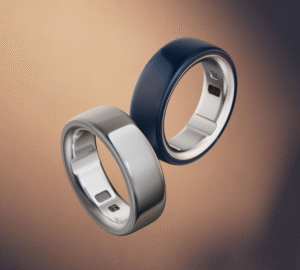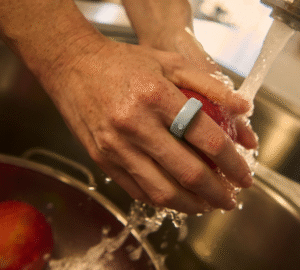Your body feels the impact of travel. The combination of disrupted routines, unfamiliar environments, and physical strain can chip away at both the quantity and quality of your sleep.
Plus, if you’ve traveled across time zones, you may experience jet lag—the temporary (but uncomfortable) feeling that results when your body’s circadian rhythm lags behind updating to the external environment.
Fortunately, you can take steps to assuage the effects on your sleep and health, so you fully enjoy your well-deserved vacation time.
Sleep, Disrupted: What Oura Data Reveals About Travel Days
If it feels like travel wrecks your sleep, you’re not imagining it. Aggregated and de-identified data from over 300,000 Oura Members shows that, compared to the night before, sleep on travel days significantly declines across several metrics. On average, travel days lead to:
- 32.2 minutes less total sleep
- 5.6 points lower Sleep Score
- 5.1 minutes less deep sleep
- 10.2 minutes less REM sleep
- 16.9 minutes less light sleep
- 0.15 ms lower average heart rate variability (HRV)
- 0.45 bpm increased resting heart rate
Additionally, a recent study from the National University of Singapore analyzed 1.5 million nights of sleep from over 57,000 Oura members. The researchers found that while sleep duration recovers quickly, sleep timing and sleep architecture can take significantly longer to realign with the new time zone. In addition, traveling eastward was found to be the most disruptive to sleep patterns; it delayed sleep onset, caused fragmented rest, and decreased the amount of time spent in both deep and REM sleep.
READ MORE: New Study from NUS Analyzes Jet Lag and Sleep Patterns From 1.5 Million Nights of Oura Data
What Causes Jet Lag?
When you land in a new location, your phone may automatically update to the correct time, but your body’s biological rhythms can’t adjust at the drop of a hat, explains sleep researcher Rebecca Robbins, Ph.D., author of Sleep for Success and Oura advisor.
Jet lag symptoms may include a feeling of general sluggishness; sleep issues like insomnia, early waking, or excessive fatigue; difficulty focusing; and even gastrointestinal issues. You may also notice signals on your Oura App that your body is adjusting to a new time zone, such as changes in body temperature or heart rate, Robbins notes.
One major factor impacting jet lag (but can also help cure it—more on that later): Sunlight. The presence and lack of light influences your circadian rhythm—or your body’s internal clock, which is based on the 24-hour cycle of the sun, and tells your body when it’s time to sleep and when to be awake.
READ MORE: The Benefits of Morning Sunlight & How to Make it a Habit
Other contributing factors to jet lag include the pressurization in planes, your own hydration level (keep sipping that H2O!), your age (older adults are more likely to experience jet lag), and the direction you’re traveling (heading east is harder to adjust to, since you lose time).
Generally, the further you’ve traveled and the more time zones you’ve crossed, the more you may be affected by jet lag. “It can take one day or longer per time zone to adjust, so if you travel five hours ahead, it could take you five days or longer to get over jet lag,” Robbins notes.
But all is not lost—keep reading for seven tips that can help you cope with jet lag and make the most of your precious PTO.
Expert-Backed Tips to Manage Jet Lag
1. First, adjust before traveling.
“The best strategy for international travelers is to prepare,” Robbins says. Gradually adjust your bedtime by 15 or 30 minutes—earlier if you’re heading east, later if you’re going westward—to nudge your circadian rhythm towards the new time zone.
You can even start adjusting your meal times toward your destination, as the time you eat can impact your circadian rhythm.
| Member Tip: Let Oura Meals unpack how well your choices are fueling you, so you can feel your best each day. Beat cravings and energy slumps, identify nutritional imbalances, and stay on track toward your goals. |
2. Then, fully switch over.
Once you land in your destination, adjust your clocks, bedtimes, and meal times to the new time zone, Robbins recommends. Try not to compare what time it is at “home” versus where you are now, as tempting as it may be.
3. Take advantage of the light.
If you are trying to stay up to adjust to a new time zone, make sure to get some evening light to encourage your body to stay awake. Conversely, if you traveled west and you’re trying to adjust, avoid that early evening sunlight so you can prepare your body to go to bed earlier.
Either way, make sure to get some morning sunlight when you wake up in your destination to encourage your circadian rhythm to start adjusting. On a work trip and staying up late on a computer or phone? Try blue-light blocking glasses to avoid sleep-disrupting blue light.
4. Turn down the temp.
Your body naturally cools down to prepare for sleep. Turning down the thermostat in your bedroom can help jumpstart that process. Another sleep-promoting hack: Take a hot bath or shower before your target bedtime to encourage your body to wind down. (Here’s why that trick works so well.)
5. Consider melatonin.
Research shows melatonin can help treat jet lag. While you want to avoid sleeping pills, you can take a small amount of melatonin (1 or 2 mg), the sleep-inducing hormone, Robbins says. Be sure to choose a high-quality, pharmaceutical-grade supplement, as studies suggest dosage can vary by brand.
6. Get moving.
“Exercise can help us stay attuned to the pattern of light and darkness in our environment, thereby making adjustments to time zones easier,” Robbins notes. “Moreover, exercise can reduce stress and improve our ability to fall asleep.” Fit in a walk, jog, or yoga session to help you adjust to your new environment, she suggests.
READ MORE: All-New Updates to Oura’s Activity Features
7. Nap if you need.
If you took a redeye, any sleep you got was probably fitful and restless. Feel free to nap that afternoon when you arrive to your destination, Robbins says, but keep it less than 90 minutes in duration. Then, take a walk to soak up the natural light in the afternoon—also a great excuse to explore your new surroundings!
| Member Tip: Check out the Explore content in your Oura App to find calming breathing exercises and meditations to help you doze off. When you nap for longer than 15 minutes, Oura automatically tracks it and shows insights such as deep sleep and REM sleep. |
LEARN MORE: Sleep Hygiene 101: How to Sleep Better Tonight












